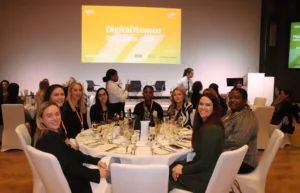NDA’s Digital Women series is talking to leaders from across our industry to understand the particular issues faced by women. Next up is Lucy Daramola, Client Partner Lead at Microsoft.
What is the biggest opportunity for women in your sector of the digital industry today?
The digital industry is evolving at a rapid pace and brands are looking to thought leaders and skilled professionals to help them understand, navigate, and utilise emerging technologies like generative AI (artificial intelligence) and machine learning.
After decades of social inequality, women now have more opportunities to become leaders and pioneers in these areas by offering their unique perspectives and skills to the workplace. For example, Mira Murati, Chief Technology Officer (CTO) at OpenAI, has been influencing the innovation and development of AI for over a decade. In reading about Murati, it becomes evident that her passion for a fair and ethical society guides much of her work. In the development of OpenAI’s ChatGPT, she placed emphasis on conditioning the large language models through reinforcement learning with human feedback, addressing any challenges in how the AI performs with the society and including the public in the conversation along the way.
Closer to home, I have been inspired by accomplished women such as Karen Blackett OBE, who currently holds the position of President of WPP in the UK. I was fortunate enough to meet Karen in 2016 and had the invaluable opportunity to receive a one-on-one mentoring session with her. As the saying goes, ‘You cannot be what you cannot see’, representation really matters and meeting with Karen instilled self-belief that I too, could achieve great things! Karen’s remarkable personal and professional journey, along with her words of wisdom has influenced and motivated my own career trajectory.
By actively participating in these fields, women can help shape the future of technology, drive innovation, and contribute to solving complex global challenges.
What are some of the challenges that you see for women in the industry? Any advice as to how to overcome it?
Last year I became a mother to a beautiful baby girl and returned to work shortly after her 1st birthday. I proudly celebrate my new title; ‘working mum’ and my company does an excellent job of supporting me.
After connecting and speaking to other women, I have learnt that not all companies are as supportive as mine and there is a need for industry-wide reform. Women, often face unique challenges when it comes to work-life balance and childcare, particularly in traditionally male-dominated industries. Additionally, we must also navigate societal expectations of the ‘traditional’
gender roles that place greater expectations on women to take on primary caregiving and household responsibilities, even when they are working full-time.
Access to affordable childcare options can also make it difficult for women to balance work and family responsibilities. According to the Organisation for Economic Cooperation and Development, the UK has the third most expensive childcare system in the world, with a full-time place costing on average £12,376 a year.
Childcare costs coupled with the lack of family-friendly workplace policies, like flexible work arrangements and parental leave, can make it incredibly challenging for women to manage their professional and personal lives.
For women who want to start a family, maternity policies are not widely publicised, or the information is not easily accessible, making the navigation of family planning, that little bit harder!
To address some of these challenges we can encourage open conversations about gender roles and work-life balance. Connect with other working parents, friends, and family members who can provide emotional support and practical assistance. Do not be afraid to ask! We should ask and encourage employers to implement flexible work arrangements, parental leave, and other supportive policies – making the information easily accessible for all prospective and current employees.
What three things could employers at companies do to make the industry better for women?
1. Implement and enforce diversity, equity, and inclusion policies: Promote equal opportunities for all employees, regardless of race or gender. Action is key so allocate budget to these initiatives, invest time to listen to those that speak up with concerns or challenges and above all, embrace employee differences.
2. Promote work-life balance: This can be achieved by reviewing flexible working hours, remote work options, and parental leave policies annually.
3. Provide learning and development opportunities targeted specifically at women. Recognise and offer support to women from marginalised backgrounds. Often, when we analyse statistics based on just gender, we fail to see the huge disparities when we overlay intersectionality such as ethnicity, religion, and even socio-economic backgrounds.
What is the biggest misconception about women and by women in the digital industry?
One of the biggest misconceptions about women is the belief that they need to adopt masculine traits or behaviours to succeed in the digital industry. To the extent that they believe having children will hinder their career progress! Times have and will continue to change; employers have an active duty to continue to advocate for change and support women who want to achieve success in both their personal and professional lives. As a woman, daughter, sister, and mother, I have a responsibility to support and encourage the women around me, as Madeleine Albright so eloquently said, “Once you have climbed the ladder of success, you don’t push it away from the building—you are only strengthened if there are more women.”









